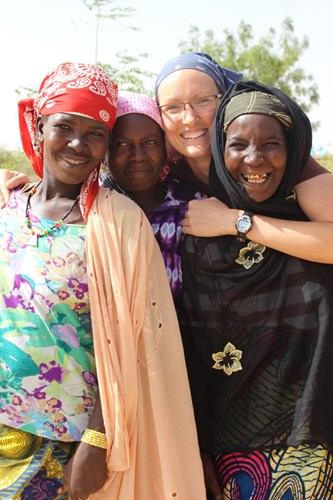French Language grad helps patients in West Africa
 Interview with Michelle Pieke, Graduate, French Language Diploma
Interview with Michelle Pieke, Graduate, French Language Diploma
What inspired you to take the program?
Though almost all of my patient care in Niger, Africa is done in the local language, medical discussions are all in French. As well, French is the language of administration and education (at least at the higher levels). Knowing that I wanted to return to work in Niger, I needed to review, refresh and learn much beyond the foundation I received in French from grades 1 to 12. Through the French Language Diploma Program (FLDP), I was able to begin this process while I was still in Canada so that when I started a French immersion program in France, I was already up to speed.
What did you enjoy most about the experience?
I appreciated that the classes were a mix of grammar and conversation. The presentations we had to give at the end of each semester showed the wide range of experiences and interests of the students.
How would you describe the program's classroom experience?
I was surprised by how many teachers there were, hoping to teach French immersion. At the same time, there was a range of professionals each studying for a different reason. I really enjoyed this wide variety of students.
How has the program helped you to achieve your goals?
The FLDP helped me to review what I had learned long ago and to start to expand on the same. It allowed me to step into the highest class level when I started my French immersion program in France, and to feel confident there.
How did learning through Continuing Studies fit into other aspects of your life?
I've always been quite an academic, so it was fun to be back in school again. The course time nicely filled an evening without being too stressful with a full-time job.
What is your career background?
I grew up in Ontario and studied kinesiology (BSc) and physiotherapy (MPT) at Western. I was happy to escape suburbia after graduation and moved to rural Alberta where I worked as a hospital physiotherapist for six years. In that time, I felt a desire to pursue missionary medicine. I spent 10 weeks in Zambia where we made several visits to a community where all of the residents were affected by leprosy. I was really touched by these people and was thus inspired to work at a leprosy hospital in Niger for three years. When I returned to Canada, I worked in private practice in Sidney, BC in order to gain enough work hours to maintain my Canadian physiotherapy license before returning to Africa.
What is your primary occupation at present?
I am a physiotherapist.
Is there a formative experience from your past that maintains its relevance or inspires you in your work/life now?
I worked for four summers as a camp counsellor at an Easter Seals camp in Ontario. All of our campers had a physical disability. Through this experience I learned medical skills I still employ today, but more importantly, these campers inspired me to show compassionate care to all of my patients, and reminded me that disability does not make anyone any less the marvellous person they are.
Who are your most important mentors/influencers?
My patients influence me and push me to do my best for them.
When you're not working, what are your hobbies and interests?
Except for while I'm in Africa, I've always been very involved in music. I'm also a recreational jogger, and people are always surprised to hear that I continue to jog here, in Africa — even in the sand, in the 30-degree heat, and while wearing a long skirt and head scarf!
Are you engaged in learning new things?
Even after three years, I'm continuing to learn the local language (Hausa). The centre I work for here in Niger also has a service for ladies with obstetric fistula. This is a condition virtually unknown at home, so I am continually learning while caring for these ladies in the realms of improving urinary incontinence and improving leg strength after prolonged labour causes tissue damage (sometimes including the nerves) within the mother's pelvis.
What one unusual experience would you recommend everyone try at least once in their lifetime?
Perhaps it's not too unusual, but to make friends with someone who has nothing to give but their love.
If you could, what one thing would you like to change/improve about the way we all experience life in the world today?
I dream of everyone experiencing true love and peace.
Want to learn more about the French Language Diploma Program?
Studying French at UVic is easier than you think. Learn to speak French, or improve your French language proficiency, and gain a detailed knowledge of Francophone cultures in Canada and around the world. This non-credit diploma program is open to adults at all levels of proficiency.
- Posted October 7, 2022
RELATED TOPICS: French Language
More student stories
- Public Relations student wins a podcast award for On Notice
- Business graduate makes a positive career pivot
- Public Relations student is awarded the 2023 Denis Racine Bursary
- Navigating a career transformation through public relations
- Broadening your perspective and knowledge of palliative care
Visit Registration
2nd Floor | Continuing Studies Building University of Victoria Campus 3800 Finnerty Road | Victoria BC | CanadaTel 250-472-4747 | Email uvcsreg@uvic.ca
2026 © Continuing Studies at UVic
Legal Notices |
Sitemap

